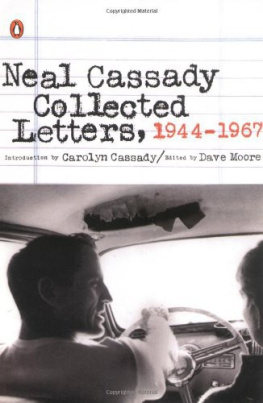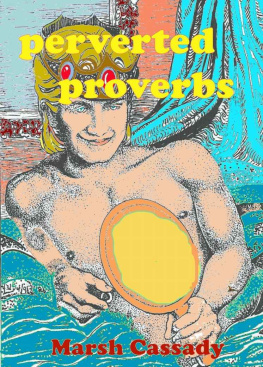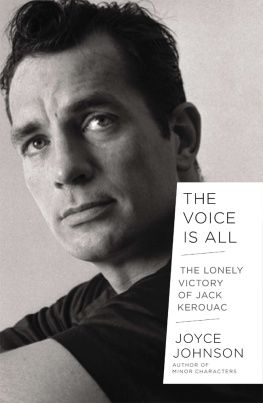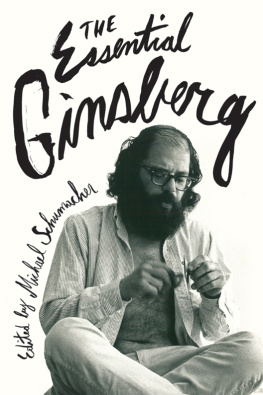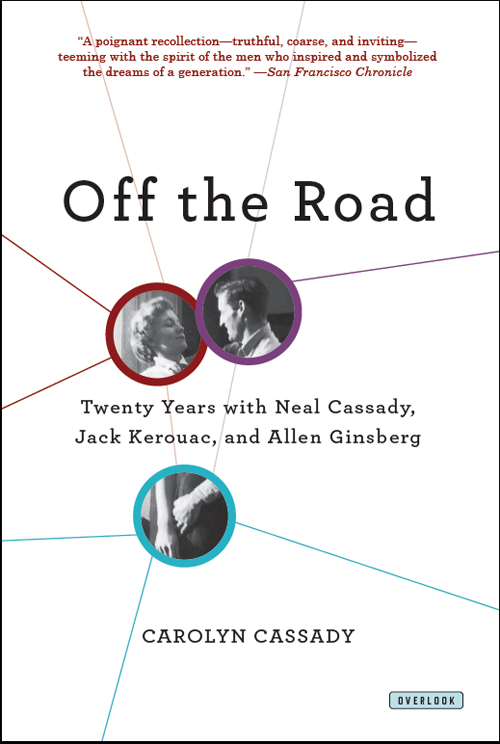This edition first published in the United States in 2008 by
The Overlook Press, Peter Mayer Publishers, Inc.
141 Wooster Street
New York, NY 10012
www.overlookpress.com
For bulk and special sales, please contact sales@overlookny.com.
First edition published in the United States in 1990 by William Morrow and Company, Inc.
Revised edition published in the United Kingdom in 2007 by Black Spring Press Ltd.
Copyright Carolyn Cassady 1990, 2007
All letters written by Allen Ginsberg The Estate of Allen Ginsberg
All letters written by Gregory Corso The Estate of Gregory Corso
All letters written by Diana Hansen The Estate of Diana Hansen
All letters written by Anne Murphy Anne Murphy
All letters written by Gavin Arthur The Estate of Gavin Arthur
The author would like to thank the following for permission to quote material in this book: Allen Ginsberg, Gregory Corso, Diana Hansen, Anne Murphy, Gavin Arthur, Ken Kesey, Elsie Sechrist, Hugh Lynn, and Creative Arts Book Company (for excerpts from As Ever: The Collected Correspondence of Allen Ginsberg and Neal Cassady, 1977). Thanks also to the University of Texas for cooperation in the preparation of this volume.
All rights reserved. No part of this publication may be reproduced or transmitted in any form or by any means, electronic or mechanical, including photocopy, recording, or any information storage and retrieval system now known or to be invented, without permission in writing from the publisher, except by a reviewer who wishes to quote brief passages in connection with a review written for inclusion in a magazine, newspaper, or broadcast.
ISBN 978-1-46830-571-5
For He shall give His angels
charge over thee to guard thee
in all thy ways.
PSALMS 91:11
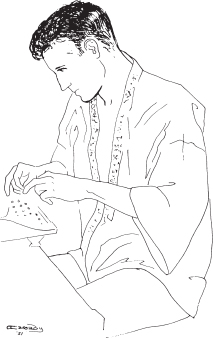
Portrait of Neal Cassady, by Carolyn Cassady, 1951.
In the middle of the journey of our life
I came into myself in a dark wood
where the straight way was lost.
Ah! how hard a thing it is to tell what a wild and rough
and stubborn wood this was,
which in my thought renews the fear!
So bitter is it that scarcely more is death;
but to treat of the good that I there found,
I will relate the other things that I discerned.
Dante, The Divine Comedy, Inferno, Canto I
A little past two oclock on that Saturday afternoon in March, 1947, the phone rang in my hotel sitting room. Bill Tomsons affected tough-guy drawl was unmistakable. Hlo, doll, cn I come up for a minute? I hesitated; Bill was becoming a nuisance. He had been turning up on campus nearly every day, and I was finding his impromptu appearances increasingly tedious. Out of curiosity I had continued to talk to him, but so far I had failed to find any subject that he would discuss seriously. He confined his conversation to what he thought would impress me smart retorts, wild bravado and stories of extraordinary exploits, either his own or those of a friend, one Neal Cassady. Neal was a hero, like Othello, whose praises needed singing, and Bill assumed the role of passionate disciple. He told me of daring escapades in cars, brushes with the law, deep intellectual and musical safaris.
Raised in fear and reverence for the prevailing social code of the Thirties and having led a sheltered, restricted existence, I was amazed to learn from Bill that there were men who dared to live like the characters in my books and movies if, of course, Bill was not exaggerating. In any case, the life he described was remote and unthreatening to me; I wasnt about to fall in love with Bill, and he told me Neal was in New York studying at Columbia University with two friends, Jack Kerouac and Allen Ginsberg, one a famous football player, the other a poet.
Bill looked vaguely like some movie star whose name Id long forgotten, and this afternoon I could visualize him leaning on the bar in the hotel lobby, a glass of Scotch in one hand, the other twisting knots in the phone cord, a cigarette dangling from his lips, one eye squinting from the smoke and the other from thick black hair that refused to stay back no matter how often he tossed his head.
After a lengthy silence, I responded, All right, Bill, but only for a minute; I have a lot of work to do. When I opened the door at his knock, I discovered he was not alone. Behind him stood another man who strode past me into the room, his eyes cataloguing the contents before he turned to acknowledge Bills introduction.
Cari, this is Neal Cassady. I could only stare, unhinged at seeing the myth materialize. Neal nodded, and in that instant, the sweep of his blue eyes made me feel I had been thoroughly appraised. I cursed Bills failure to warn me.
The advance publicity on this man had already rendered him unique, but I was not prepared for his appearance not so much his physical attributes, which were all fairly average, but his suit. Though not an authentic zoot, it had that aura, and Id never been closer to one than the movie-screen gangsters. It gave him a Runyonesque flavour, a dangerous glamour, heightened by his white T-shirt and bare muscular neck.
Neal walked across the room, seeing a phonograph and a stack of LPs under the window. He turned to me, still a statue by the door.
Bill tells me you have an unusual collection of Lester Young records. Bewildered, I stammered: Who? Lester who? I uh no unusual, yes; Im afraid Ive not heard of him all I have are leftovers from college swing mostly big bands. I glared at Bill for this further embarrassment. Neal, too, looked at Bill for a second, mystified. Then he smiled, sat down in my rocker and began flipping through the albums.
No matter. What have we here? Ah, yes, I see, Artie Shaw, good, the Dorseys, Benny Goodman, great, Harry James, Nat King Cole, Stan Kenton, the Duke a lot of Ellington. Ah, and what is this? He held up a boxed set by Josh White.
Thats Southern Exposure. Its about as radical as we ever got in college. We were impressed by Josh and his black protest songs about their poor housing, Jim Crow trains, etc. It is banned in the south, I hear. When I lived in New York I got to know Josh a little I sat at a front table in a club and drew him while he played. I found that ploy worked really well if you wanted to meet an artist. But I was surprised and disappointed finding that he didnt want to discuss the subjects of his work. Probably a good thing, really. That can get sticky.
I knew I was babbling, but Neal sat transfixed, emitting an empathy and dignity that made me feel special, as if my every word were a gem. Beneath his subtle charm I sensed a taut energy that was subdued and restrained, like a drawn bow.
When I stopped and looked down blushing, he smiled more broadly.
Fascinating. May I play something? His eyebrows always sloped upwards and inwards at the centre when he asked a question.
Of course please.
As he placed a record carefully on the turntable, I dived to the floor to gather together the pieces of model stage scenery on which I had been working. Bill stopped pacing and sat in the armchair opposite Neal. Ellingtons Sophisticated Lady filled the room, and no one spoke. I glanced up at Neal and quickly down again. As he rocked, his eyes fastened on me so intensely, I felt a physical stab. I was sure he sensed my discomfort, but I also felt those eyes like lasers, unwavering until the record ended. Moving to remove it, Neals manner eased. I stood up and pottered about the room pretending to straighten things.


